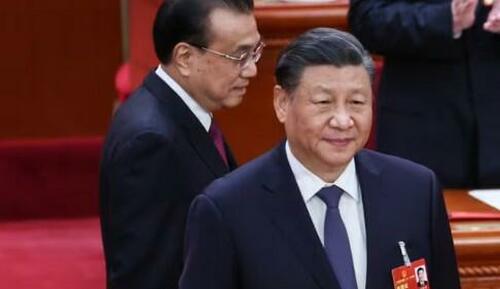
In a move that we wouldn't be surprised to see take hold in the U.S., China is now reportedly cracking down on its citizens who have a negative opinion regarding the country's economy.
A new Nikkei article detailed how the country's spy agencies have turned their focus to the country's financial naysayers.
"Various cliches that denigrate the Chinese economy have emerged. False theories about 'China's deterioration' are being circulated to attack China's unique socialist system," the country's Ministry of State Security said at China's recent annual conference to set economic policy.
When the Ministry opened its WeChat account in summer of this past year, its first post on August 1 simply read: "We need to mobilize the entire Chinese society to crack down on and prevent espionage."
The revelation that the spy agency has been so openly active on WeChat was unexpected, the report says. While its main functions include targeting spies and engaging in counterintelligence operations, protecting China's economy is not typically within its scope.
However, the agency's recent posts following the Central Economic Work Conference on December 11-12, along with similar communications after a significant economic policy meeting in late October, suggest that the ministry is broadening its range of responsibilities.
"How strange that China's economic policies for next year, ones that have just been adopted, were first explained by the Ministry of State Security," one Chinese economist told Nikkei.
The spy agency's recent social media activity, coinciding with growing online skepticism about the government's optimistic economic narrative, implies a crackdown on those providing objective yet critical analyses of China's faltering economy.
Experts highlighting issues like the exodus of foreign companies and declining consumer confidence, often with detailed economic data, are particularly at risk. These analyses typically avoid directly contradicting the government's assertion of achieving a 5% growth target, reflecting caution under China's strict speech regulations.
The Ministry of State Security, traditionally focused on counterintelligence, is now venturing into economic discourse - a shift that suggests the Chinese government views overly realistic or negative economic assessments, which it considers influenced by foreign narratives of decline, as threats to national security. This indicates potential repercussions for those with pessimistic viewpoints, the report noted.
Read the full report here.
In a move that we wouldn’t be surprised to see take hold in the U.S., China is now reportedly cracking down on its citizens who have a negative opinion regarding the country’s economy.
A new Nikkei article detailed how the country’s spy agencies have turned their focus to the country’s financial naysayers.
“Various cliches that denigrate the Chinese economy have emerged. False theories about ‘China’s deterioration’ are being circulated to attack China’s unique socialist system,” the country’s Ministry of State Security said at China’s recent annual conference to set economic policy.
When the Ministry opened its WeChat account in summer of this past year, its first post on August 1 simply read: “We need to mobilize the entire Chinese society to crack down on and prevent espionage.”
The revelation that the spy agency has been so openly active on WeChat was unexpected, the report says. While its main functions include targeting spies and engaging in counterintelligence operations, protecting China’s economy is not typically within its scope.
However, the agency’s recent posts following the Central Economic Work Conference on December 11-12, along with similar communications after a significant economic policy meeting in late October, suggest that the ministry is broadening its range of responsibilities.
“How strange that China’s economic policies for next year, ones that have just been adopted, were first explained by the Ministry of State Security,” one Chinese economist told Nikkei.
The spy agency’s recent social media activity, coinciding with growing online skepticism about the government’s optimistic economic narrative, implies a crackdown on those providing objective yet critical analyses of China’s faltering economy.
Experts highlighting issues like the exodus of foreign companies and declining consumer confidence, often with detailed economic data, are particularly at risk. These analyses typically avoid directly contradicting the government’s assertion of achieving a 5% growth target, reflecting caution under China’s strict speech regulations.
The Ministry of State Security, traditionally focused on counterintelligence, is now venturing into economic discourse – a shift that suggests the Chinese government views overly realistic or negative economic assessments, which it considers influenced by foreign narratives of decline, as threats to national security. This indicates potential repercussions for those with pessimistic viewpoints, the report noted.
Read the full report here.
Loading…





